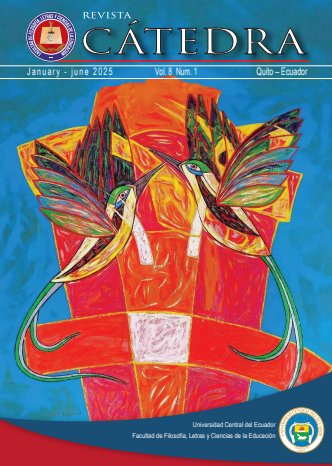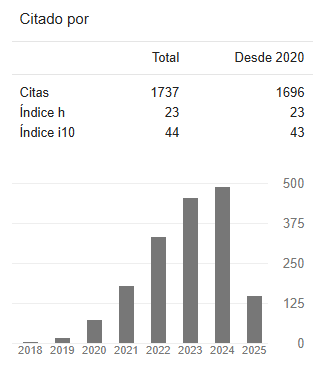Leadership: analysis of professional management performance in educational institutions in educational institutions
DOI:
https://doi.org/10.29166/catedra.v8i1.4529Keywords:
Professional managerial performance, educational quality standards, educational leadershipAbstract
This research work is based on the study of the leadership style of four educational institutions: fiscal, fiscal-commissioned, municipal and private, in which the auditing processes by the Ministry of Education (MINEDUC) showed ineffective results in terms of professional managerial performance. The objective of this study is to analyze the relationship between educational leadership and the achievement of educational quality standards of professional managerial performance. A mixed documentary and field approach was used. For the collection of information, surveys addressed to managers and teachers were used, validated by means of Cronbach's Alpha coefficient, and expert interviews were conducted. We worked with a probabilistic sample of 152 teachers from the referred institutions, 12 managers and 2 experts in professional managerial performance, officials of the Educational District 17D08-Los Chillos-Quito. It is highlighted that managerial leadership styles: transformational, distributed, dialogic and sustainable, present a very high significant relationship with the dimensions of managerial professional performance, in the opinion of the experts, managers should strengthen their management of the pedagogical leadership style. As the main conclusion, there is a high correlation between the distributed and sustainable leadership styles and the pedagogical management dimension, which allows identifying that it is necessary to strengthen managerial competencies in these two leadership styles due to their importance in meeting educational quality standards.
Downloads
References
Asamblea Nacional. (2021). Ley Orgánica de Educación Intercultural. Registro Oficial Nº 417. https://educacion.gob.ec/wp-content/uploads/downloads/2021/05/Ley-Organica-Reformatoria-a-la-Ley-Organica-de-Educacion-Intercultural-Registro-Oficial.pdf
Ahumada, L. (2018). Modelo para el fortalecimiento del liderazgo distribuido en escuelas y liceos mediante indagación colaborativa. https://www.lidereseducativos.cl/wp-content/uploads/2019/02/NT9_MODELO-PARA-EL-FORTALECIMIENTO-DEL-LIDERAZGO-DISTRIBUIDO_26-12-18.pdf
Balda, R., & Guzmán, A. (2015). Liderazgo educativo transformacional como necesidad de las instituciones educativas en la república de Ecuador. Revista REFCALE, (15), 1-15. http://refcale.uleam.edu.ec/index.php/refcale/article/view/370/296
Barba, L., & Delgado, K. (2021). Gestión Escolar y liderazgo del directivo: aporte para la calidad educativa. Educare, 25(2), 1-14. https://revistas.investigacion-upelipb.com/index.php/educare/article/view/1462/1399
Bolívar, A. (2014). El liderazgo educativo y su papel en la mejora: una revisión actual de sus posibilidades y limitaciones. Psicoperspectivas, 13(2), 1-16. https://www.psicoperspectivas.cl/index.php/psicoperspectivas/article/view/112/140
Cabezas, E. (2018). Introducción a la metodología de la investigación científica. http://repositorio.espe.edu.ec/jspui/bitstream/21000/15424/1/Introduccion%20a%20la%20Metodologia%20de%20la%20investigacion%20cientifica.pdf
Cantón-Mayo, I., García-Martín, S., Cañón, R., & Grande, M. (2021). Calidad y liderazgo sostenible. International Journal of Educational Leadership and Management, 9(1), 76-91. https://www.hipatiapress.com/hpjournals/index.php/ijelm/article/view/5361
CEPPE. (2009). Prácticas de liderazgo directivo y resultados de aprendizaje. Hacia conceptos capaces de guiar la investigación empírica. Revista de Educación, 349, 77-97. https://www.redalyc.org/pdf/551/55114063003.pdf
Crisol, E. (2010). Reseña de "Cómo hicieron los sistemas educativos con mejor desempeño del mundo para alcanzar sus objetivos" Barber, Michael y Mourshed, Mona (2008). Profesorado. Revista de Currículum y Formación de Profesorado, 14(2), 301-303. https://www.redalyc.org/articulo.oa?id=56717074023
Choque, P. (2015). La gestión en Comunidades de Aprendizaje: un espacio de participación. https://www.comunidadedeaprendizagem.com/uploads/materials/582/e556e7c448d9239442c1d1f1c02a0082.pdf
De Mello, M. (2015). La importancia del liderazgo sostenible como una estrategia de las organizaciones. Revista Ciencias Estratégicas, 23(34), 209-218. https://www.redalyc.org/articulo.oa?id=151350864004
Fabara, E. (2015). La situación de los directivos de las instituciones educativas en el Ecuador. https://dspace.ups.edu.ec/bitstream/123456789/11036/1/La%20situacion%20de%20los%20directivos%20de%20las%20instituciones%20educativas%20en%20el%20Ecuador.pdf
Hernández-Sampieri, R. (2014). Metodología de la investigación (6ª ed.). http://observatorio.epacartagena.gov.co/wp-content/uploads/2017/08/metodologia-de-la-investigacion-sexta-edicion.compressed.pdf
McKinsey. (2007). Informe sobre sistemas educativos. http://www.americalearningmedia.com/edicion-010/117-noticias/844-informe-mckinsey-sobre-sistemas-educativos
Ministerio de Educación (MINEDUC). (2011). Estándares de desempeño profesional directivo: Propuesta para la discusión ciudadana. https://educacion.gob.ec/wp-content/uploads/downloads/2012/08/Estandares_Desempeno_Directivo_Propedeutico.pdf
Ministerio de Educación (MINEDUC). (2017). Manual para la implementación y evaluación de los Estándares de Calidad Educativa: Gestión Escolar, Desempeño Profesional Directivo y Desempeño Profesional Docente. https://educacion.gob.ec/wp-content/uploads/downloads/2017/12/manual-para-la-implementacion-de-los-estandares-de-calidad-educativa.pdf
Ministerio de Educación (MINEDUC). (2019). El liderazgo dialógico como motor de cambio en los centros de educación inicial. Pasa la Voz, 10(2), 5-8. https://educacion.gob.ec/wp-content/uploads/downloads/2019/09/Septiembre-2019.pdf
OCDE. (2009). Mejorar el liderazgo escolar: Herramientas de trabajo. Organización para la Cooperación y el Desarrollo Económicos (OCDE). https://www.oecd.org/education/school/43913363.pdf
Presidencia de la República del Ecuador. (2023). Reglamento General a la Ley Orgánica de Educación Intercultural. Registro Oficial Suplemento No. 254. https://educacion.gob.ec/wp-content/uploads/downloads/2023/03/reglamento-LOEI-2023.pdf
Downloads
Published
Versions
- 2025-07-02 (3)
- 2025-07-02 (2)
- 2025-01-30 (1)









